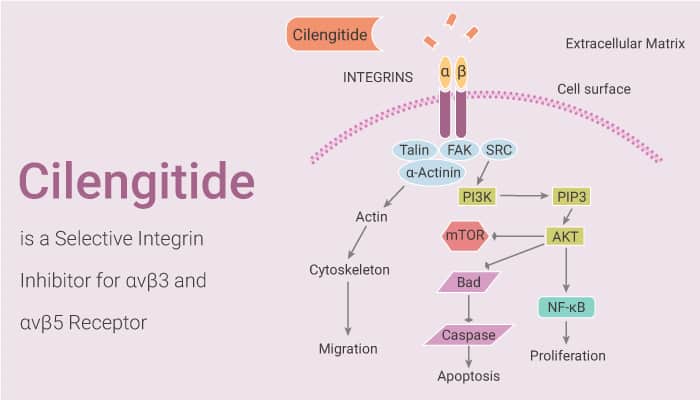Integrins are heterodimeric cell surface adhesion receptors that consist of two noncovalently associated alpha and beta subunits. In particular, Integrins are heterodimeric transmembrane proteins composed of one α and one β subunit. Especially, Integrins are crucially important because they are the main receptor proteins that cells use to bind to and respond to the extracellular matrix. Cilengitide is a potent and selective inhibitor of the integrins ανβ3 and ανβ5. Particularly, the integrins ανβ3 and ανβ5 appear to be particularly important in the process of angiogenesis. The integrins ανβ3 and ανβ5 express in a variety of malignancies, including melanoma, breast cancer, prostate cancer, and colon cancer.、

The critical role of integrins in angiogenesis and association with tumor progression makes them an attractive target for anticancer therapy. Therefore, Cilengitide is a well-tolerated antiangiogenic agent. This agent is a cyclized RGD (Arg-Gly-Asp motif)-containing pentapeptide and blocks integrin ανβ3- and ανβ5-mediated endothelial cell attachment and migration. Moreover, Cilengitide inhibits binding of ανβ3 and ανβ5 to Vitronectin with IC50s of 4 and 79 nM, respectively. Furthermore, Cilengitide inhibits integrin-mediated binding to Vitronectin with IC50‘s of 0.4 and 0.4 μM in human melanoma M21 or UCLA-P3 human lung carcinoma cell lines.
In vivo, Cilengitide (10, 50, and 250 μg) demonstrates inhibition of tumor growth in nude mice. As a result, there is a reduction in both tumor volume (55%, 75%, and 89%, respectively) and tumor weight (23%, 38%, and 61%, respectively)
To summarise, Cilengitide is an antiangiogenic agent that inhibits the binding of integrins ανβ3 and ανβ5 to the extracellular matrix.